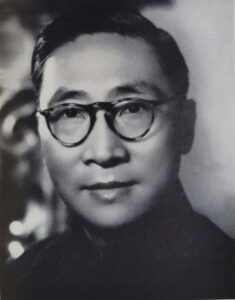Bridging Eastern Philosophy and Western Christianity
John Ching Hsiung Wu
The BFG Handbook is more than a modern guide; it is a continuation of Wu’s mission to proclaim the Gospel with renewed vigor, clarity, and relevance, bridging cultural divides and inspiring a deeper understanding of the universal truths found in Christ.

John Ching Hsiung Wu’s life, work, and spiritual legacy align profoundly with the mission of the BFG Handbook, making them both vital contributors to the shared goal of restoring the truth of the Christian faith and making disciples of all nations. Wu’s remarkable journey—from a childhood steeped in Confucianism and Buddhism to his conversion to Catholicism—illustrates the transformative power of the Gospel to transcend cultural and philosophical boundaries. This transformation is not only an inspiring testament to the universal call to holiness but also a model for how faith can resonate deeply across diverse traditions. Similarly, the BFG Handbook seeks to bridge gaps in understanding by presenting the Gospel in a fresh, universal language that speaks to the modern heart while honoring cultural diversity and shared values.
Wu’s contributions to the dialogue between Taoist thought and Christian theology exemplify the inculturation called for by the New Evangelization. His translation of the Tao Te Ching and his reflections on its compatibility with Christian truth are groundbreaking examples of how the Gospel can be contextualized within other cultural frameworks without compromising its core message. The BFG Handbook continues this mission by reframing the Christian message using the Tao Te Ching as a foundation, demonstrating how its timeless wisdom is fulfilled in Christ. By doing so, the handbook invites people from various backgrounds to explore the Gospel in a way that respects their cultural heritage while opening their hearts to the transformative power of Christ. This shared approach reinforces the universal nature of the Gospel, which is not confined to any single culture but is capable of addressing humanity’s deepest spiritual longings.
The BFG Handbook and Wu’s work share the belief that the Gospel’s truth must be presented in ways that resonate with the complexities of the modern world. Wu’s profound respect for Eastern traditions and his ability to integrate their wisdom with Christian theology align perfectly with the handbook’s mission of presenting shared truths that transcend divisions. In a world where cultural and political differences often overshadow shared values, both Wu’s writings and the handbook provide a way forward by emphasizing the unifying power of truth. This is not a dilution of the Gospel but a renewal of its expression—one that is bold, clear, and deeply relevant to today’s global challenges.
Wu’s spirituality, deeply influenced by St. Thérèse of Lisieux, also resonates strongly with the principles embodied in the BFG Handbook. St. Thérèse’s “Little Way,” which emphasizes humility, simplicity, and trust in God’s love, shaped Wu’s understanding of holiness as something accessible to all. This approach mirrors the handbook’s call for believers to embrace the beauty and truths of the faith through simple yet profound principles that guide everyday life. Just as St. Thérèse inspired Wu to see holiness in small acts of love and trust, the BFG Handbook encourages believers to live out their faith in ways that are relatable, transformative, and deeply rooted in the Gospel’s universal truths. This simplicity is critical in an age where complexity often obscures the accessibility of the faith.
Moreover, Wu’s influence on figures like Thomas Merton highlights the importance of building bridges between spiritual traditions, a goal the BFG Handbook shares. Wu’s ability to engage Taoist and Christian thought inspired Merton to explore the intersections between Eastern and Western spirituality. This shared vision for interfaith dialogue and mutual enrichment reflects the handbook’s mission to foster understanding and unity among people of different faiths. The handbook does not aim to water down the Christian message but to highlight its ability to illuminate truths found in other traditions, showing how Christ is the ultimate fulfillment of every human quest for meaning and truth. This approach aligns with Wu’s example of engaging non-Christian philosophies with humility and respect, paving the way for deeper connections and mutual understanding.
The BFG Handbook is more than a modern guide; it is a continuation of Wu’s mission to proclaim the Gospel with renewed vigor, clarity, and relevance. Both Wu and the handbook respond to the Church’s call for a New Evangelization—an evangelization that is new in ardor, methods, and expression. Without such tools, the Church risks losing its ability to articulate the faith effectively to a world that is increasingly diverse, fragmented, and in need of a unifying message. Wu’s legacy and the BFG Handbook remind us that the truth of the Gospel is not just meant to be preserved but shared in ways that inspire, transform, and unite people across every culture and tradition.
In summary, the mission of the BFG Handbook aligns seamlessly with the life and work of John Ching Hsiung Wu: both seek to restore the truth of the faith and to make disciples of all nations by engaging hearts and minds with a message of hope, love, and transformation. By embracing a universal language of truth, fostering interfaith dialogue, and presenting the Gospel with clarity and compassion, the BFG Handbook ensures that the Church continues to fulfill its mission of evangelization in a world that desperately needs the light of Christ. Together, Wu’s example and the handbook’s principles create a powerful blueprint for how to live and proclaim the Gospel in our modern age, uniting diverse traditions under the banner of God’s infinite truth and love.
